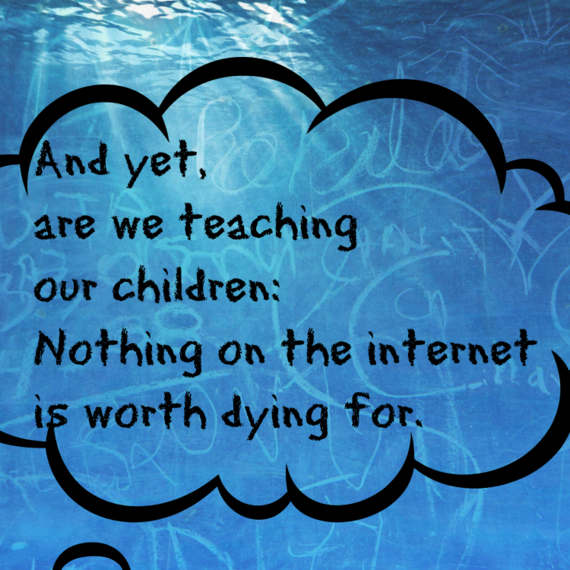The Message that The Internet is Forever...
Yesterday I met a mother whose middle son died by suicide. She bravely shared about his life cut short because of two bad decisions. At some point last year, he took an inappropriate picture and shared it, privately.
When that picture became public, after being tormented with the possibility for no one knows how long, he decided that humiliation was more than he could bear. His life ended at aged 15.
How many times have we told our children, "The internet is forever" and "You can't take it back."
This tragedy brought to me the realization we must also tell our children: "And yet, nothing on the internet is worth dying for."
**I feel compelled to clarify here that I mean we, as a community, need to better support and teach our children. We need to support THIS family and every family by learning, loving, teaching, preventing more losses, which are too often and too important to continue losing.**
When it comes to sharing online...
So much to know, so many changes, the methods and the impacts evolve. The philosophy, "When you know better, do better," applies as much to online sharing as any other aspect of life.
Storytelling As Advocacy
Whether blog, social media, short form, long form, articles, fiction or non-fiction, our combined stories online are documenting history in real time by more people than have ever done in the history of mankind. This combination and diversity of voices can, and I hope will, create social awareness and positive change towards more accepting, open, and accommodating societies at an exponentially increased rate because of the sheer humanity of these connections. Connections promote organic and lasting change
There are many ways and forums that these stories are shared. The first, easiest, and most obvious is Social Media. There are many fears that drive a decision to not do this - and these are real and should be considered.
The Cons
Exploitation. Misunderstanding. Manipulation. Judgment.
Also, particularly for those of us who are allied with and within the disability community, we must also consider: who has the right to tell whose story? Can stories cause harm? Can sharing be misunderstood? Can posts, even well-intentioned, create damage?
Yes. Yes, to all of this. No matter what - all of those will be possible.
Three things:
1)If your writing and story involves more than you: there are assent, privacy, and dignity considerations that should be the first priority in your disclosure of any story involving another person. This article: "Parents Of Children With Disabilities: Are We Speaking With Or For A Community?" by Melissa Stoltz published on Two Thirds of the Planet is written by a mom, like me, who brings up some good points and questions to consider before you hit publish on a post. Are you writing something you'd like to read about you, if it were you?
2) In that article she mentions the terms ableism and inspiration porn, if you are not familiar with these concepts, become familiar with them and be cognizant of them in your words and your sharing.
3) Make sure you are telling your own story and not camouflaging it as anyone else's and do your best. Wait - maybe that was four. Well no one's perfect and that's worth considering, too.
The one thing I can tell you for certain about when to hit publish is when the pros outweigh the cons.
The Pros
Connections. #Truth. Get help. Give Help.
Let me give you recent example - maybe you saw it. Robb Scott is a dad who sat in his car after hearing strangers in a store speak about Ds in a derogatory and honestly uninformed way. He didn't say anything in the store and then, once in his car, he self videoed his response.
It is honest. It is moving. It has since had hundreds of thousands of views and been covered by major news outlets around the world. Can any or all of previous Cons happen in response to Robb's video? Yes, and probably have to some degree.
But the pros are this: He said what many other people needed to hear. Perhaps they are other parents who understand and feel he said it "best," perhaps they are strangers who don't really know anyone with Down syndrome and could learn from this perspective. Whatever the mix of his reach - his truth made an impact and spread throughout social media.
It is said we cannot make great change in this world, only small changes with great love. This is a particularly good example of that. He spoke from the heart and that great love rippled around the world.
Small changes are great changes to the people they affect. So that's what I say about that.
Most of social networking is what I would call Micro-stories. Snippets of real life and day to day and they have a place and they matter.
In summary, when it comes to sharing online:
1) Think about what you are posting, take the implications of your words and online actions seriously.
2) Forgive yourself as you learn. Forgive me for what I do not know. Teach me. Teach yourself.
3) Weigh it out - When you can do good, do it.
Originally published on MardraSikora.com
